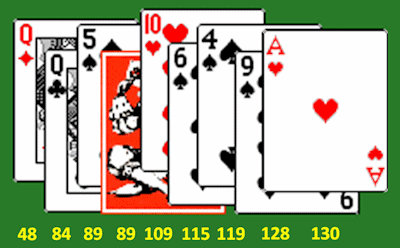Copyright
- Cards
- 52 plus (optionally) 2 or 4 Jokers. Deal seven cards each and stack the rest face down. Each card has a counting value,
which is its face value multiplied by its suit value. The face values are Ace = 1, Two = 2, and so on up to Ten 10,
Jack 11, Queen 12, King 13. The suit values are
 = 1,
= 1,
 = 2,
= 2,
 = 3,
= 3,
 = 4.
Thus the lowest card is
= 4.
Thus the lowest card is  A = 1
and the highest
A = 1
and the highest  K = 52. Jokers count zero and belong to no suit.
K = 52. Jokers count zero and belong to no suit. - Object
- To bring the current value of all cards played to exactly 100, or, if the count exceeds 100, to some higher multiple
of 10 (110, 120 etc). As a matter of interest, the shortest possible game is when the leader plays
 K and the follower
K and the follower
 Q, as the two highest cards in the pack total 100 exactly.
Q, as the two highest cards in the pack total 100 exactly.
- Play
- Starting with non-dealer, you each in turn play a card face up to the table and announce the total counting value of all cards so far played (as at Cribbage). Stop when the count reaches exactly 100 or some higher multiple of 10. Alternatively, of course, stop when you run out of cards. Whether or not you are allowed to add a Joker when an exact multiple of 10 is reached is for the players to agree between them. Personally, I'm against it.
- Scoring
- For making 100

The first player wins with a score of 6 exactly score 1 per card played to the display. For any higher count, deduct 1 point for each 10 in excess of 100. In the illustrated example the first player brings the count to 130 on the ninth card, thus scoring 6 (9 for cards minus 3 for excess tens). If all 14 cards are played without reaching a multiple of 10, neither player scores but the score for the following deal is doubled. If it happens again it is trebled, then quadrupled, and so on. - Game
- Play up to any agreed target score. A convenient method is to start with a pool of 21 or 31 counters and take one for each point you score. The winner is the player with most counters when the last has been taken. Each new deal is made from a thoroughly shuffled reconstituted pack. Alternatively, remove from the game the cards that have been played, replenish each hand up to seven cards again, and continue until not enough cards remain in stock.
- Optional extra
- You may agree that first card you each play from your hand of seven must be the highest-valued card you hold. If you hold two or more of equally highest value you may chose freely. This rule gets the game up and running more quickly, but its main point is to add to the skill factor by giving you each some information about your opponent's hand. Both started with their highest cards in the illustrated example.